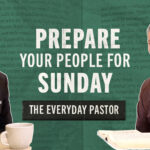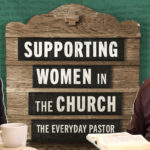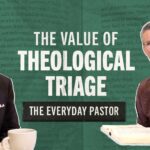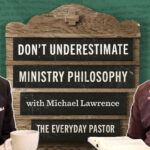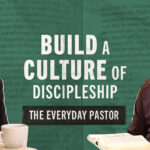Do your members prioritize the Lord’s Day? Are they maximizing their time at church? In a hyperbusy age, we can serve our people by preparing them to come on Sundays ready to grow, ready to serve, and ready to launch.
In this episode of The Everyday Pastor, Ligon Duncan and Matt Smethurst offer practical tips for helping your congregation get the most out of corporate worship.
Recommended resources:
- How Can I Make the Most of Sunday Services? by Erin Wheeler
- Listen Up: A Practical Guide to Listening to Sermons by Christopher Ash
- The Practical Works of Richard Baxter, Vol. 1: A Christian Directory by Richard Baxter
- J. I. Packer: An Evangelical Life by Leland Ryken (see Packer’s essay “A Mouthpiece for God”)
- Make the Most of Sunday Mornings: Two Simple Changes by Matt Smethurst
Transcript
The following is an uncorrected transcript generated by a transcription service. Before quoting in print, please check the corresponding audio for accuracy.
Ligon Duncan
We’re being edified so that we can edify others, and that, of course, means in the body, but it also means in the rest of our life. And so helping people understand the connection between gathering together and then the rest of their life is another important part of preparing people for worship just
Matt Smethurst
showing up is a ministry. It’s not just the discipline of attendance. We have a line in our church covenant we will commit to the Ministry of attendance, not neglecting to meet together for worship and fellowship, because no one can faithfully follow Jesus alone.
Matt Smethurst
Welcome back, friends to the everyday pastor, a podcast from the gospel Coalition on the nuts and bolts of ministry. I’m Matt smitherst and I’m LIG Duncan, and we in this episode are going to be talking about how to prepare your people for Sunday mornings. And LIG, before we think about how to prepare people to make the most of their Sundays. Let’s just establish the fact why it’s a conversation worth having at all. Why? Why is faithful church attendance non negotiable in the life of every Christian? There
Ligon Duncan
are a lot of good answers to that question. One is that we need one another. God, God did not save us to live lives in isolation from one another. We need one another, and that’s one reason why the assembly is such a wonderful thing. Sometimes you don’t feel like seeing one another, but then when you see one another, you realize I needed this. But from a biblical, theological standpoint, Matt, you know this from Exodus 24 on in the Bible, from the from the worship service that happens at Sinai in Exodus 24 there is a weekly pattern of worship for the rest of the Bible from Exodus 24 on where the people of God gather, they hear the word read. They hear the word explained. They sing, they pray. They in the New Covenant, of course, they celebrate the Lord’s Supper and administer baptism. And so there’s this wonderful weekly cycle of gathering that starts there in Exodus 24 and it goes all the way through the Gospels on the on the Lord’s day after the resurrection of Christ, and then in the epistles, in First Corinthians, and in Acts, you see the church gathering again on a weekly basis. And it’s a wonderful rhythm that the Lord just put into place that has been operating for the people of God for three and a half 1000 years now. And early Christians followed the same pattern, and we do today, and that rhythm, I know, for me is a pastor, that rhythm really, really helped me, and it’s one of the things that I miss the most. I get to preach, you know, two or three, four Sundays a month, depending on what the month is and where I am, but being in the same place, Lord’s day after Lord’s day with the same people. That was edifying for me as a pastor, I hoped that I was edifying my people, but it was edifying for me to be in the same place. And I I so often I’m, there’s, there’s an introvert side to me, and I would often be in a sort of a an emotional, spiritual situation where I felt like hiding and being with the people of God drew me out in all the sort all the best ways. How about you?
Matt Smethurst
Well, when I think of this idea about Sunday being, you know, obviously a day as a pastor that I want my people to look forward to, and I want them to get the most out of it. One of the things I’m trying to help them remember is that church is not just an event you show up to. It’s a family you belong to. And therefore, if if you belong to King Jesus, Sunday is the most important day of your week. Doesn’t mean it’s the easiest day. It doesn’t mean it’s always going to feel like the most life giving day, but it is, in a sense, the high water mark of your week, because it’s the day our King got up from the dead, and so we assemble to worship him. And I think just starting off this conversation LIG it’s worth referencing Hebrews 10, where the author writes starting in verse 24 and let us consider how to stir up one another to love and good works, not neglecting to meet together, as is the habit of some, but encouraging one another, and all the more as you see the day drawing near. Several years ago, as I was studying this, I noticed that the way the author has written, even the grammar of the sentence is a bit different than we may expect. We would expect him to say, let us consider how to stir up one another, to love and good works. And then he gives the how. That’s verse 25 How do you do that, not neglecting to meet together. More, as is the habit of some but, and then he’s going to say the alternative. So you’d almost expect him to say, not neglecting to meet together, but rather meet together. But instead he says, but rather encourage one another, which is profound, because that means that encouragement is almost a stand in it’s it’s shorthand for showing up to church, yeah, which means that just your physical, embodied presence on a Sunday, when you don’t feel like getting out of bed, you don’t feel like getting all the kids in the car, or your your elderly parent, or whatever the case may be, when you feel like skipping church. This verse ought to challenge you to remember the fact that actually just showing up is a ministry. It’s not just the discipline of attendance. We have a line in our church covenant where we say we will commit to the Ministry of attendance. That’s a DNA phrase, and we call it the ministry of attendance because that’s what Hebrews says it is we will commit to the Ministry of attendance, not neglecting to meet together for worship and fellowship, because no one can faithfully follow Jesus alone. Now I trust we’re speaking to pastors, so I don’t know why they’re in in this vocation if they don’t think it’s important to show up to church, but we know that people in our churches don’t always see the importance of that, especially in a day and age when extracurricular activities like kids sports and other things are competing for Sunday mornings. So let’s let’s help pastors think about how they can disciple people to think wisely about Sundays and kind of getting the most out of it. So as you reflect on your nearly 20 years at first pres Jackson, how did you teach people to prioritize and maximize the Lord’s day,
Ligon Duncan
I wish I had done more of it sooner, Matt, but definitely later on in my ministry there, I realized I was working hard to do the best job that I could do for them, in preaching, in praying, in reading the scriptures, in working with the other ministers to put the services together, even in talking about what we were going to do before and after the services, we were working hard to make sure that we were serving the people as well as we could, as much of The word of God, as much of the means of grace, as much efficiency and effectiveness in what we did, being careful about what we said, how much we said, when we said it, how we said it, I realized after a while, I need to Help God’s people know more what they need to do to prepare to get the most out of this. And part of that is just explaining to them what we’re doing and why we’re doing it. And I found that people responded well to that, but one, one of my one of my little sort of calls to my students now is, help your people know how to listen to preaching, how to benefit from preaching. Because sometimes you can come to a worship service with a bit of a consumer mindset, and you’re, you know, you’re looking what, what am I going to get out of this? And if you by
Matt Smethurst
sometimes, you mean about 50 out of 52 Sundays.
Ligon Duncan
And if you, if you look at a sermon that way, it probably is going to limit the benefit that you derive from it. And so if I, if I go into a sermon knowing first of all what a sermon is trying to do, and then how that sermon edifies me. And if, as a pastor, I help my people know how to prepare to listen to a sermon they’re going to be I loved a phrase that you used some time past when we were talking about our people being easily edified. You know, if you go into a sermon saying, Pastor, all I want you to do is open up the Word of God and just throw me a bone. Yeah, just give me. Give me some help. I’m not looking for the greatest sermon ever preached known to man. I’m not looking for you to be what are, you know, some great pulpit. I’m just faithful to the Word of God. Open it up, expound it, apply it. But I’m also thinking, what do I need to do to receive this? How is this supposed to edify me? And so I do think pastors need to help their people know how to listen to sermons. And we’ve talked before a little bit. There’s a little book by Christopher Ashe where he talks about how to listen to a sermon. Richard Baxter, in the Christian directory, has a section of the directory where he talks about how to listen to a sermon. Jack Packer has written on how to listen to a sermon. As a pastor, I wish I had talked to my people about how to listen to a sermon. Earlier on
Matt Smethurst
right, we’ll link to some of those resources in the show notes for folks. Yeah, the way I try to help my people think about it is you should strive resolve, even to come hungry and leave full, to come hungry and leave full, and that’s what you’re talking about coming hungry, you’re not just going to show up to church in the ideal spiritual mood. So often, our souls are sluggish. We’re like a car that’s been, you know, sitting out in the cold or the freezing rain, and it’s going to take a while for the engine to rev up and for the heat to start working. And so we should if, if at all possible, find out what our preacher is going to be preaching that coming Sunday, and read the passage beforehand. This is not a groundbreaking idea, but I don’t understand why it’s not more common practice. Because if you read the passage beforehand, it’s going to benefit you. You’re going to show up more eager to hear how your pastor is going to handle this or that. You’re going to be leaning in, you’re going to be locked in, and that’s going to help you get more out of the sermon and and pray for your pastor. Yeah. So, you know, we hold, we rightly hold pastors to a high standard according to first, Timothy three and Titus one. But do you hold yourself we should ask our people, do you hold yourself to a high standard of prayer for him, right? In other words, what you get out of your pastor’s sermons is not just up to him, it’s also up to you. Yes, he needs to prepare well and preach faithfully, but you have to also come with a posture in which you’re hungry for God’s word. You’re not just a professional sermon listener. You’re not just there to be entertained or intrigued. You’re there to be fed and changed. That’s
Ligon Duncan
good. Another thing like that, Matt, though, is also letting people know what the scripture readings are going to be in a service, if you’re in a church which has distinct from the sermon, a scripture reading, and that’s a good pattern to have. The early church had a pattern of reading through the scriptures in public worship services. And Paul will even say to Timothy, until I come give attention to the public reading of Scripture. So if you’re a church that does that, I would encourage you let people know what the scripture reading plan is. And as pastors, you know that’s something I would work on that with Derek Thomas. When Derek and I were at First Presbyterian Church in Jackson together, we would plan out not only the sermon series together, we would plan out the scripture readings, and we would try to be in an Old Testament passage for the scripture reading. If we were preaching through the New Testament, would they be thematically related, not necessarily and but it was amazing how often they ended up being thematically related. When you’re reading through the Word, we just tried to have a balance of okay, you’re gonna read some from the law, some from the prophets, some from the writing, some from the Gospels, some from the epistles. And an unwritten rule for us is we always wanted to be in a gospel somewhere, whether it whether we were preaching through a gospel or reading through a gospel, or there was some sort of Wednesday night emphasis that we just like to be in a gospel somewhere, but we planned out the scripture readings just like we planned out the sermons, and then we would let the congregation know what we’re planning to read through, what’s coming up next, and that would be published. A lot of churches I see are publishing their bulletin, you know, on Thursday, so that people can actually go online, look at the bulletin, know what’s coming up in the service. That’s a great thing to do. Encourage pastors to tell people ahead of time what’s going to happen in the service of worship. I know, worshiping with you, Matt, you prayed for an area congregation in the public prayer, developing people’s expectations of what’s going to happen in the public prayer helps them in the service. It’s hard to listen to prayer, so anything that we can do to help our people follow along. I mean, tell them what your prayer outline is ahead of time, right? Tell them that you are going to be praying for an area church, a sister congregation in your city, to help them know, okay, I know where the pastor is. That pastor is not just up there winging this. He’s actually prepared for this prayer because he wants to glorify God. He wants to converse with God, but he also wants me to be edified as I join him in praying, help him on that. So I think the more pastors do to point people to the things in the worship service and how they are to participate and how those things are going to edify them, the more meaningful those things are going to be for church members. When they come
Matt Smethurst
to church. Basically, most of the best ideas in our church are not original to me, so I’ll just mention two. These are ideas that members had, which I think has helped them prepare for Sundays. One is that before I preach through a given book. So at this point in our short life together as a church, we’ve worked through mark and Ruth and Philippians and judges, and now we’re in first Peter and we’ve had members just initiate a hey, anyone who wants to come over to our living room on this Saturday evening to read through that entire book in one sitting before Matt begins to preach it. They’ve they’ve done that. I never even thought of that idea, but it’s just so encouraging to me to get a photo. You know, when I’m preparing to preach the first sermon in a series, I get a photo from a living room with all these church members who are just reading, reading the whole book together. And the other thing is, is our music leaders have created two Spotify playlists. One is all the songs in our catalog that we’ve ever sung together as a church, but the other one is our upcoming songs for that Sunday. So good. So not only are we sending out the service guide on Thursday so people can see what are those scripture readings and and all the rest, but also, what? What songs are we singing? And here’s a playlist where you can easily just be warming your heart
Ligon Duncan
before it’s so good to know what you’re going to sing and to have the opportunity to think about specific lyrics ahead of time, because it goes by so fast when, when you’re in the when you’re in the public service, worth you may have a favorite, you know, stanza of a hymn or a song I
Matt Smethurst
like to tell myself, our sermons go by fast for people,
Ligon Duncan
but the singing especially, and if you’re, if you’re not ready, you miss it, you know, and you’re, oh, I missed I missed that. I tried thinking about such and such when that song came along. So I love that you not only tell them what it’s going to be, but you actually give them something they can listen to. Not everybody is musical. And every little help that you can give people to be able to help sing, know the tune that’s going to be sung, be able to concentrate on what they’re saying while they’re singing. That’s a wonderful thing. Well,
Matt Smethurst
and even the versions of songs that he’s choosing are that tend to be more congregational versions. So in other words, I mean, a lot of them are from the together for the gospel albums and things like that, because we’re, you know, he’s not going to put on the playlist the most highly produced, professional version of each song, because that’s not what it’s going to sound like on Sunday, as we’ve talked about in a previous episode, the church is the worship team you’re coming to sing. The only other thing I’d want to add about listening to sermons is that the more theologically minded, biblically literate. One is the easier it becomes, I think actually, to sit back and and relax and think I I’ve heard this before. Yeah, rather than thinking, Who here hasn’t right? I’m not just here for myself. I’m here for others, or I know this already. Pride says I know this already. Humility says I need this again, sure, and that’s something that I think we just pray for our people and encourage them to lean into. So we’ve talked about the kind of theological, biblical preparation. What about social preparation? So you know, come hungry, leave full. But I also like to tell people, if you can, and I realize this is not a reality for everyone in every stage of life, but if you can come early and stay late, talk about the benefit of just coming to church with a certain posture in terms of seeing others. Oh,
Ligon Duncan
I think that it starts on Saturday. You know, as you as you plan, heading towards Sunday, and even making sure that your Saturday night is not you know, sometimes you’ve got a wedding to go to and you’re going to be out a little while because of that wedding, or there are other activities like that that come along, and you’re not in control of that. But when you can control your Saturday night schedule so that you can get a good night’s sleep and you can be refreshed when you wake up on Sunday morning. That helps. So I you know Saturday night in praying for the service before you go to bed. You know, Lord, prepare my heart to receive the means of grace tomorrow as I gather with God’s people, I loved how you called the church a family. What was the phrase that you said again,
Matt Smethurst
churches is not just an event you show up to. It’s a family so good, okay?
Ligon Duncan
So it is. It’s a family gathering to meet with God, and so on Saturday night, one of the last things you’re going to do is prepare my heart even now and bless the pastor as he leads us in the reading and preaching of the word so as a family. We meet with God tomorrow, and then you get up in the morning, you’re probably the same thing. And so I do think some preparation on Saturday really helps get ready for Sunday. Now, just
Matt Smethurst
just a quote my friend Dean and Sarah, he always says, Sunday morning church is a Saturday night decision, true.
Ligon Duncan
And now you and I were just talking off the air about you’ve got twin boys, and so you never know when you’re going to be up on Saturday night with twin boys. And there are people in the country there. There are godly single mothers, and it’s all they can do is get the church with their kids. There are people with physical ailments and disabilities where it’s a real challenge for them to get to church. We’re not We’re not belittling how challenging it can be just to get to church. We’re saying it’s a good thing to prepare mentally and spiritually for the gathering of God’s people. I
Matt Smethurst
do just want to underscore what you just said, because that’s such a good caveat there are some people for whom, whether it’s because they struggle with depression, maybe they’ve been hurt in the context of a church. You know, there’s all kinds of maybe there’s serious health issues where just getting to church can be a heroic act. Yeah, I heard someone say that we may never know the treacherous journey some have taken to land in the pew next to us, and so we want to be very clear about that, but, but we’re more trying in this in this episode, to focus on those who don’t wince when they think of church, but who are tempted to perhaps yawn, yes. How can we encourage them to lean in and make the most of their Sundays? So that’s right, when you do show up like, you know, how can you make those
Ligon Duncan
again? I do. I do try to get to church early. I did when I was a pastor. I really, really tried to get to church super early, and my wife very kindly allowed me to go to church first, and she would get the kids to church, which was that was a real sacrifice that she was making for the congregation to do that on her own, but I needed to be in The physical location where we were going to worship three hours ahead of time, just to get my head together. And so I was at church early on Sunday mornings, early on Sunday afternoons, and that helped me just feel like I was not running through a million last minute details in my mind, and I was able to concentrate on what I was doing, and I needed that time now, as when I go to my home church, where I was the pastor, and now I’m just in the pew, I still like to get there early. I don’t get there three hours early, but I’ll typically try to get there 20 minutes early, and I’ll take my place in the pew. I have the opportunity to quietly pray. We have friends in their services, where they’ll have the whoever’s leading music will sing hymns before the service, and I think that’s a wonderful way. We do two songs with you. And I love that. I think that’s one of those edifying things to do. You get there early, you can still see friends and hug and talk, but then to just start getting into the spirit of what you’re going to be doing for the next hour or so by singing. And so I love that.
Matt Smethurst
And just so listeners, what we’re talking about, these are songs of preparation, where people are not standing, people are sitting. They can sing if they’d like, but it’s kind of the cue, hey, come in from the lobby. Take your seat. Prepare to worship God, and if you’d like to go ahead and start singing.
Ligon Duncan
And then, as I recall when I was with you, after that singing time, someone stands up and welcomes the congregation and visitors, and there’s certain announcements that are made at that point in time, and then called the civil worship service begins at that point. But I if to be able to be there a little bit early to get ready that way is it just helps me. I like to be there a few minutes early. I understand that there are always going to be people. It’s they’re coming in. It’s a wing and a prayer. They’re just training through the parking lot. I would tell, I would tell pastors visiting pastors that were, they were preaching our 830 service on Sunday morning, and said, Don’t be discouraged at 830 we have an 830 and we have a nine o’clock. By the time you get up to preach, they’ll all be there. But, you know, interestingly, the early service had a lot of parents with young kids, and it was, it was just hard to get all of those young kids ready, yeah, and be on time every single Sunday. So I understand all of those dynamics, but where you can control. Your schedule and plan for your schedule getting to church early, I think, will help you be edified.
Matt Smethurst
One other thing that I want to encourage pastors to consider teaching your people is is how to come with a heart, not just to serve, but to ask spiritually intentional questions. It is so easy to just fall into conversation where you’re only talking about the latest show or fantasy football, things like that, which are fine in and of themselves, but you don’t ever end up actually talking about the thing that has brought you together, namely Jesus and His people, church. And in other words, church, it should not be awkward to talk about church at church, yeah, but I find so often after the service ends and we disperse and we’re lingering in the hallways, it can feel, it can it can feel a bit uneasy to say, Hey, what did, how did the Lord encourage you this morning, right? Was there a song or something mentioned in the sermon that you’re really going to be carrying with you this week? Just resolve to make that normal in the life of your church, where people are, are are realizing that the Sunday service is the starting gun for the week, and it’s it’s when that word begins to reverberate through the life of the congregation. I do want to commend a new little booklet by Aaron Wheeler, by and she’s a wonderful pastor’s wife down down in in Arkansas, but it’s called, How can I make the most of Sunday services? That’s exactly what we’re talking about. And she has just great word pictures. At one point she writes, find a church where people are not just physically present during the service, but gone immediately afterward, like roaches in the light. Don’t come to church to fill a seat and leave. Worshiping the Lord in spirit and truth means giving of yourself for the sake of God’s people. Again, we’re not being legalistic about this. Not everyone can linger afterward, but if you can, and especially if you can resolve to meet someone new. And this is one of the great things about having like a Sunday evening service. That’s more of a family time, because something I’ll say to our churches, hey, on Sunday mornings, try to talk to someone you don’t know before you talk to someone you do Sunday evenings. I don’t care. Sunday evening, just, you know, but Sunday mornings, have eyes for others, for visitors, for those who may not even yet know the Lord, and be intentional in your conversation.
Ligon Duncan
If I can say, as a Presbyterian, who we’re not famous for being the most friendly people on on Sunday, I have been consistently edified by congregations where I can tell where that what you just said has been emphasized, either from the pulpit or somewhere else in the life of the congregation. Let me give testimony to one when I was in Edinburgh, Scotland, when I got there, one of the churches that I knew about was Charlotte chapel, which is a wonderful Baptist congregation in downtown Edinburgh. Derek prime had been the pastor there. Alistair Begg was his assistant there for a period of time. It’s just a wonderful evangelical Bible believing congregation, but the people are super friendly. And you know, Brits are not known for being the most outgoing and gregarious to strangers, but these were incredibly warm to this American postgraduate student that they did not know from Adam’s house cat. And I could tell this has been emphasized in this congregation, that we’re not just going to talk to our friends as and that’s important to do. I want to say it’s really important to talk to your brothers and sisters in Christ in the congregation when you gather, but they’re also looking out for people that they don’t know, or people that are visiting. And I felt so welcomed by that. I have been in so many churches like that where I could tell these folks have been instructed that church is not just about me and me getting with my friends. It’s about me, looking to include people that may not be familiar with us, may not be a part of the fellowship already, and that makes a huge difference, right?
Matt Smethurst
It’s not just about you. Our friend Mark dever likes to tell the story of when he was in Cambridge, he knew a brother who was just a dynamic spiritual influence, a discipler, an evangelist. He knew his Bible. He was well respected, but he didn’t belong to a church. And Mark asked him one day, Hey, brother, I’m so encouraged by your ministry. Why just why aren’t you a member of a church? And the guy looked at Mark and was not trying to be funny, not trying to be prideful, but he just said with sincerity, because honestly, I think those people would slow me down. To which Mark replied, You know what, you’re probably right. They probably would slow you down. But have you ever considered that maybe God wants you to help speed them up? Mm. Yeah, it’s not, in other words, it’s not just about us, it’s in what we derive. So I love that you sounded that note now that we’re wrapping up this episode, one last thing like so we’ve talked about preparing our people to grow. That is, you know, come hungrily full, preparing our people to serve. That’s come early and stay late. But what about that kind of final movement of preparing our people to launch? How can we let Sundays send our people into the week for faithfulness?
Ligon Duncan
One is a sense of urgency that we come to the service. I need to meet with God. I need to meet with God, with my congregational family, but I need this so that I can live the Christian life, so everything that happens in that service is preparing me to serve the Lord, to be salt and light, to be a faithful disciple and follower of Jesus during the week. It’s good to have in our minds this. It doesn’t end here. Yeah, we’re being edified so that we can edify others. And that, of course, means in the body, but it also means in the rest of our life. And so helping people understand the connection between gathering together and then the rest of their life is another important part of preparing people for
Matt Smethurst
worship. And you know, some churches will will have a sign that says you are now entering the mission field, right? And that’s, that’s a, that’s a fine reminder. It’s a good reminder. But I also want people to realize and we’re also entering the week as a church family. It’s not just Sundays, where we do the family thing, and then the rest of the week we’re on mission. We are actually called to live the Christian life together throughout the week, bearing one another’s burdens, rejoicing with one another and taking responsibility for one another’s spiritual welfare. Well, thank you everyone for listening to this episode of the everyday pastor. We hope it’s been an encouragement to you. If you have been blessed by it, please share it with another pastor so that we can continue helping pastors find fresh joy in the work of ministry.
Ligon Duncan (PhD, University of Edinburgh) is chancellor and CEO of Reformed Theological Seminary, president of RTS Jackson, and the John E. Richards professor of systematic and historical theology. He is a Board and Council member of The Gospel Coalition. His new RTS course on the theology of the Westminster Standards is now available via RTS Global, the online program of RTS. He and his wife, Anne, have two adult children.
Matt Smethurst serves as lead pastor of River City Baptist Church in Richmond, Virginia. He also cohosts and edits The Everyday Pastor podcast from The Gospel Coalition. Matt is the author of Tim Keller on the Christian Life: The Transforming Power of the Gospel (Crossway, 2025), Before You Share Your Faith: Five Ways to Be Evangelism Ready (10Publishing, 2022), Deacons: How They Serve and Strengthen the Church (Crossway, 2021), Before You Open Your Bible: Nine Heart Postures for Approaching God’s Word (10Publishing, 2019), and 1–2 Thessalonians: A 12-Week Study (Crossway, 2017). He and his wife, Maghan, have five children. You can follow him on Twitter/X and Instagram.









